Inexact Science: Exactly the Book for Hockey Fans

Inexact Science: The Six Most Compelling Draft Years in NHL History
ECW Press/November 2021
By Evan Dowbiggin & Bruce Dowbiggin
Review by Paul Deegan
November 28, 2021
Inexact Science: The Six Most Compelling Draft Years in NHL History, written by the father-son team of Bruce and Evan Dowbiggin, pulls back the curtain on six of the NHL’s most fascinating drafts. The book is meticulously researched, which is not surprising given that Evan is a sports statistical researcher for TSN, and Bruce was a longtime CBC sports broadcaster.
The draft puzzle, as defined by the Dowbiggins, can be “the way to victory”, or “the road to ruin”. For prospects, it can lead to riches or disappointment. The roots of the modern draft go back to 1963, but the amateur draft, as it was known at the time, bears little resemblance to today’s draft extravaganza.
By way of illustration, Garry Monahan, selected number one overall in that inaugural draft, didn’t even know there was a draft and only found out after-the-fact when the Canadiens’ legendary general manager Sam Pollock called to relay the good news.
The authors note that many teams failed to pick up on the importance of the draft in the early days. However, smart managers, with teams like the Canadiens, Islanders, and Oilers, recognized the value of “stockpiling picks through trades”, and they went on to create Stanley Cup winning dynasties.
The Dowbiggins note that drafting is just the first hurdle when it comes to building a dynasty. Training and development are needed to turn top prospects into legends.
The first draft the authors examine is 1971, when Guy Lafleur went number one overall, and Marcel Dionne went second. Lafleur, whose #10 tricolore jersey was eventually retired in Montreal, wore #4 for his hero Jean Béliveau while playing junior hockey. He racked up 130 goals and 207 points in 62 games during his final amateur season. That Lafleur wound up in Montreal, and not in California as Dionne later would, reflects the brilliance of Sam Pollock, who pried a first-round pick from the Oakland Seals with the nerve a burglar and the skill of a top CEO.
Smart managers, with teams like the Canadiens, Islanders, and Oilers, recognized the value of “stockpiling picks through trades”, and they went on to create Stanley Cup winning dynasties.
Pollock would continue to nab first-round picks from weaker competitors. More than any of his contemporaries, Pollock proved that drafting and stockpiling those picks, not trading, was the ticket to the Stanley Cup. He knew that many top draft selections would not become superstars, so he sought as many picks and he could – even by manufacturing trades years earlier to secure high draft picks.
The authors conclude each chapter about these six drafts with a look at the actual top draft picks and their own “re-draft”. Interestingly, Lafleur and Dionne are the only one-two combination that make the cut in the Dowbiggins’ re-draft – although subsequent actual #1 picks Mario Lemieux, Eric Lindros, Sidney Crosby all make the Dowbiggins’ re-draft. Comparing these actual vs. re-draft lists, it is a headscratcher that Mark Messier could have ever gone 48th in 1979, or Patrick Roy, Brett Hull, Luc Robitaille and Gary Suter could have gone 54th, 117th, 171st, and 180th respectively in 1984, after the Penguins so astutely picked Lemieux as #1.
They note that the “hockey gods are capricious”, but stockpiling top picks comes through as a strong theme. Scouting for top talent is a “hit-and (mostly miss)” proposition. According to scout Mike Futa, “It’s the only job where you can be right 15 percent of the time and be ruled a Hall of Famer or a success.”
Evan and Bruce Dowbiggin take the reader down a fascinating road that will be loved by hockey fans everywhere. To suggest, however, that its appeal will only be to hockey nuts and stat geeks is to sell it far too short. Inexact Science has much broader appeal. It has much to teach us about the importance of selecting and developing top talent and it offers interesting historical nuggets and perspectives about everything from Quebec to the former Soviet Union. Heading into the holidays, if you’re looking for a perfect stocking stuffer, Inexact Science is exactly what you need.
Contributing Writer Paul Deegan is a lifelong Montreal Canadiens fan. He was deputy executive director of the National Economic Council in the Clinton White House and led government and public relations at BMO and CN.
